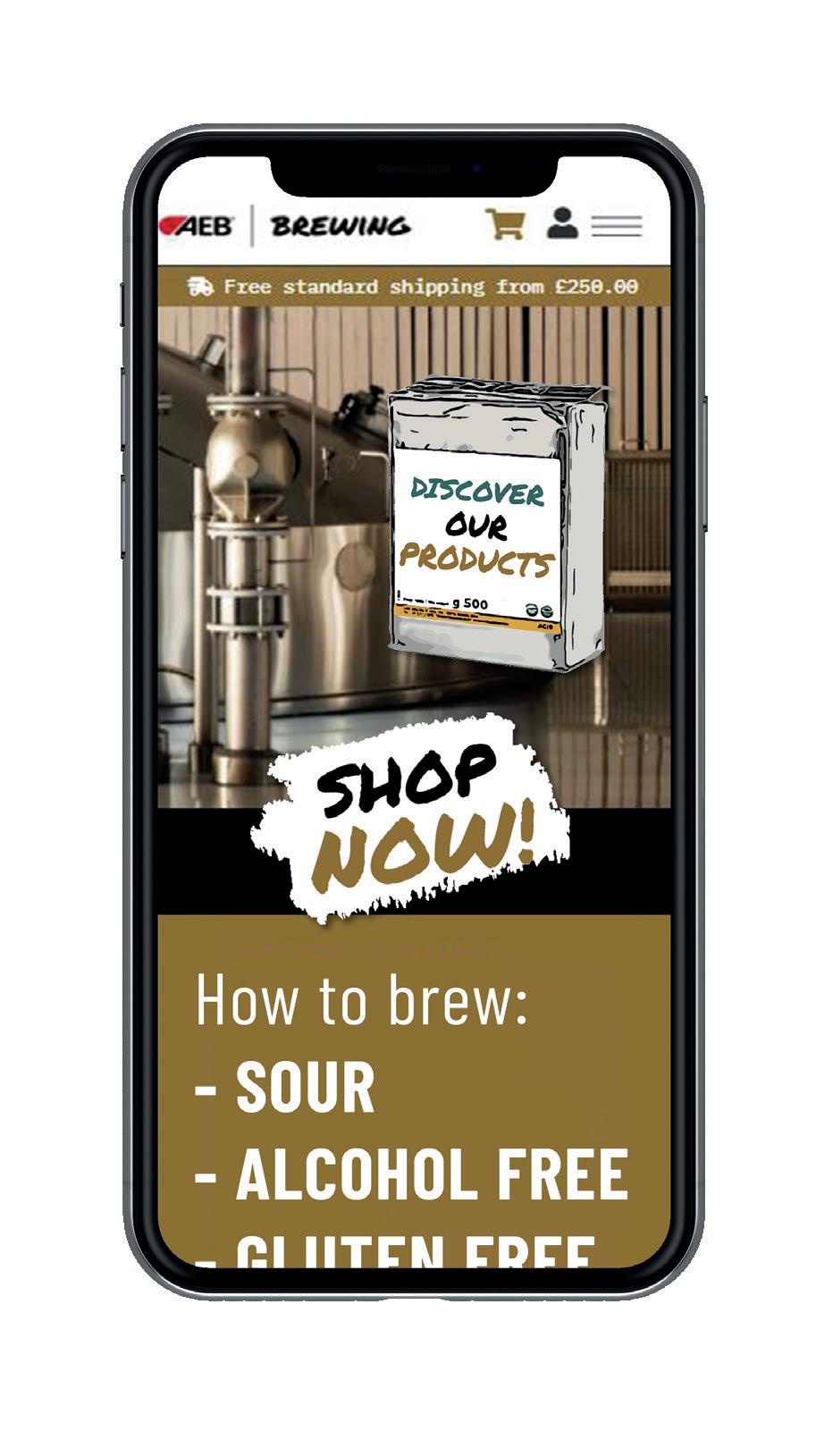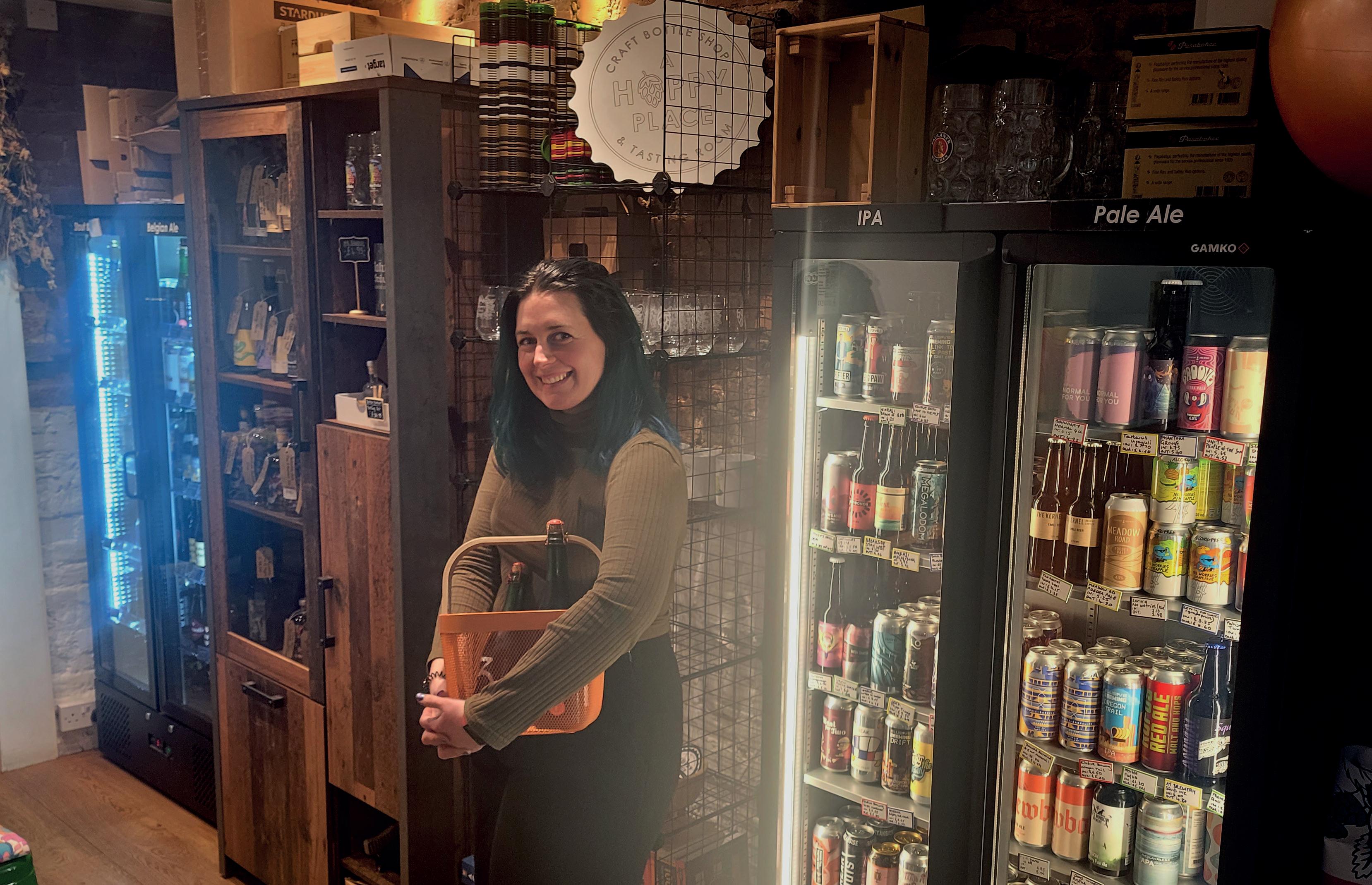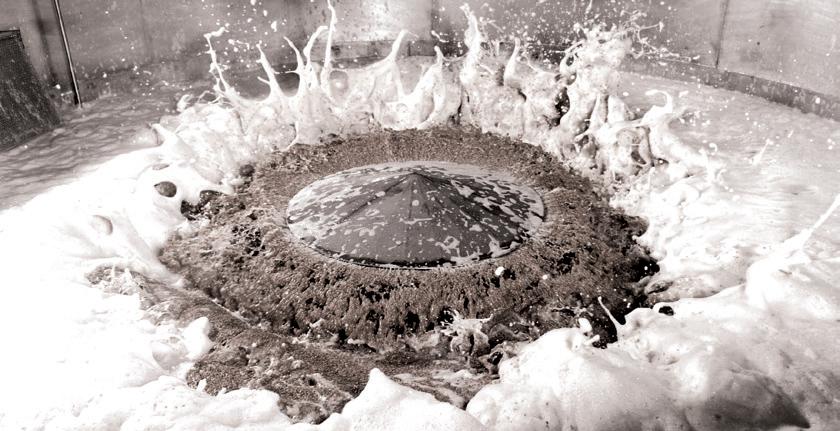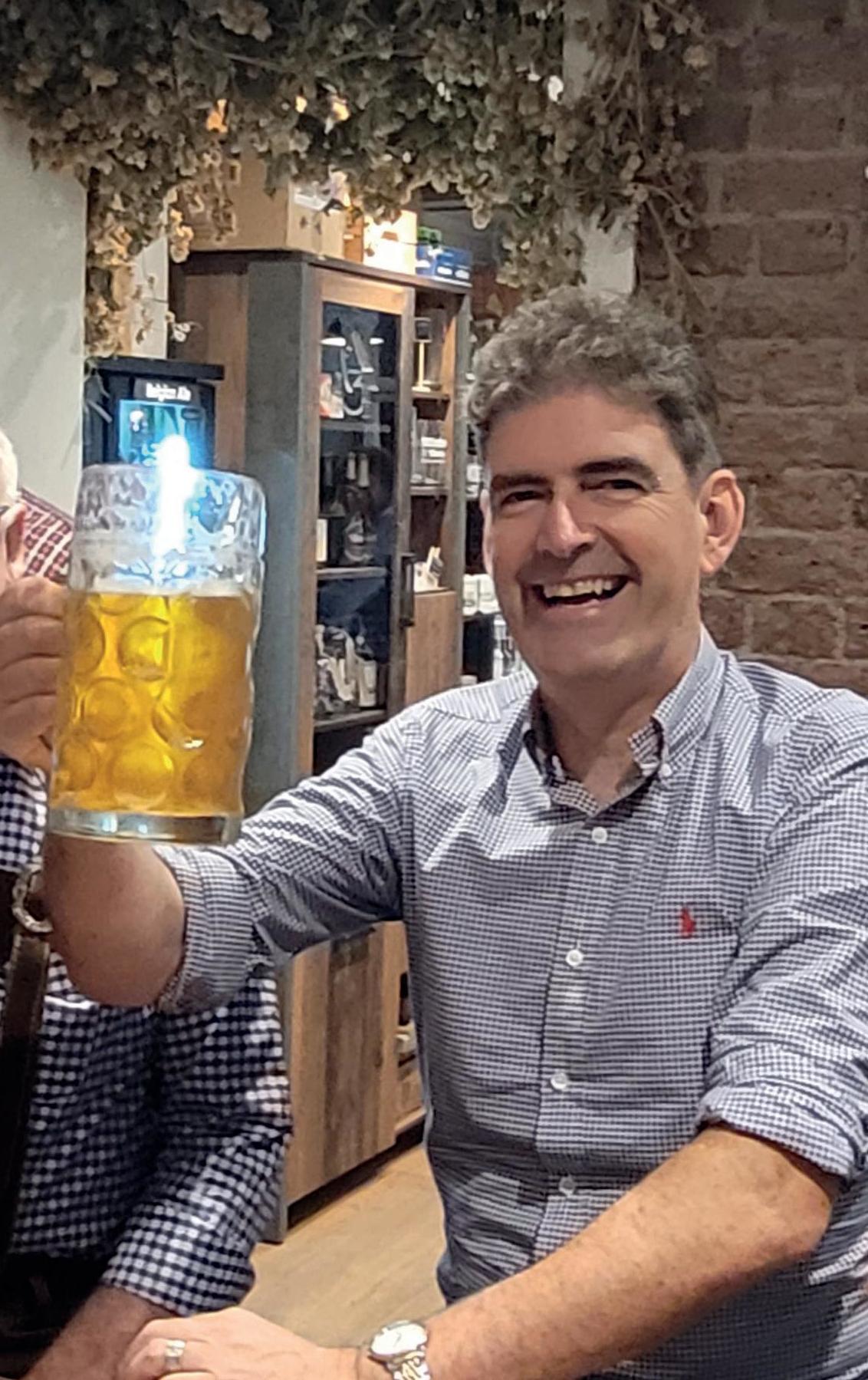
21 minute read
Meet the retailer A profile of SIBA Business
Hoppy ever after
Craft beer had always played a big part in the lives of Dave and Naomi Hayward, even before they decided to launch their own independent taproom and bottle shop in 2019. The couple even staged a beer festival for guests at their wedding, and they were subsequently inspired by the many taprooms and independent bars and bottle shops they found while exploring California on their honeymoon. Not seeing anything like that in their corner of Berkshire when they returned home, the idea for A Hoppy Place was born. Naomi quit her job in the fashion industry and began working full time in the beer sector, first at Lovibonds and then at Mad Squirrel, before a chance stroll led the pair to walk past the perfect site in Windsor which was to become home to their new venture. The small site does both on and off-trade sales and can host around 25 seated guests or 40 standing. It offers 12 keg beers and two to three cask beers on draught as well as over 150 bottled and canned products, and was recently named UK Craft Beer Retailer of the Year at the 2021 SIBA Business Awards. Inclusivity is key to the operation, and the venue is an antidote to an increasingly digital world, with a mission to bring local people together and encourage face to face conversation and discussion. Naomi and her brother Jason work full time at the site, while Dave continues to juggle his day job in IT with evenings spent behind the bar or re-stocking the cellar. Independent Brewer’s Caroline Nodder caught up with Dave in November to find out more about how he and Naomi came to launch the business, what plans they have to expand, and what winning a SIBA Business Award so early in their journey has meant to them…
Business Basics
Name: A Hoppy Place Founded: August 2019
Location:
Windsor, Berkshire
Owners:
Dave and Naomi Hayward Number of retail sites: 1 Staff: 2 (full time)
Product categories and
sales mix 12 keg lines, 2-3 cask lines & 150-200 bottled and canned beers. Selection of wines, spirits & ciders.

You can just come in and talk about beer or talk about whatever. First and foremost we are about experiences, not drinks, not profits. The most important thing is that we can sell whatever beer we like, whenever we want to sell it, we're not constrained by anyone else.
How did you come to launch A Hoppy Place and how has the business developed since then?
“Naomi and I have always been big beer fans. It was always a hobby and an interest. We started going around seeking out new breweries, and for our wedding in 2017 we put on our own beer festival - and that was our wedding! Then in 2018, we went to California for our honeymoon. And what was really interesting to me - and I think it was born out of necessity because of their system - was that if you wanted to get interesting beer to people, you just opened your own place. We just came across dozens and dozens of these places that had 30 or 40 taps of interesting beer from different people. And we thought, why did that not exist here? What they had to do in America to get that mix was start their own place, so if we wanted to have a place that's got a couple of 100 different products at any one time, we should probably do the same thing, which is start our own place. That's what turned it from being a hobby into being a career aspiration. So from day one, we had those 12 kegs, two to three casks, and 150 plus cans and bottles. That's the way we always wanted it to be. We live in Maidenhead, so a little distance away from Windsor, and Windsor had the sort of demographic of people that will work for a place like this. It's craft beer, it's people that have got a little bit more disposable income, and so on. At the time, Naomi used to work in fashion as a graphic artist, but she'd left that industry and started work first of all at Lovibonds Brewery in Henley and then as a general manager for Mad Squirrel at their High Wycombe site in Hertfordshire. And then we just walked past a building with a sign in the window, and it escalated basically. We got an offer accepted on that site, and it all started to happen very quickly!”
What is the ethos behind the business?
“First and foremost, it's about all aspects of inclusivity. So the most important thing is that we can sell whatever beer we like, whenever we want to sell it, we're not constrained by anyone else. And then what we really want is to be a place where anyone can have a conversation. Just far too much - and it's getting, I think, worse and worse with social media at the moment - far too much of our discourse now is just arguments, very short arguments, and, and we just wanted people to come in, talk and think and feel welcome. It's a really bright, airy space. It's not the kind of pub I used to drink in, where it’s that 1970s dinge, and the 10 people in there all turn around and look at you as you go through the door if you're not local. We wanted the opposite of that. So you can just come in and talk about beer or talk about whatever. First and foremost we are about experiences, not drinks, not profits.”
How do you select the beers you stock?
“It's changed a bit. Lockdown has affected it. But the first thing that we wanted to do, again influenced by the American scene, is to focus on local or hyperlocal. In America local means anything within about an eight hour drive, which is mad, but for us, it means the Counties around us because we're very blessed in Windsor, there's really a huge amount of good beer around us. The nearest Counties are Herts, Berkshire, Sussex, Surrey and London itself. And there's a lot of fantastic beer around. So we wanted to really focus in, especially on the Berkshire scene. But then beyond that, as things have evolved, we've had to get more and more of the ‘hypey’ headline craft beer in. And that's really as we've had to focus more on the website and getting those clicks, getting that conversion, we just needed the big beer as well. But if it's good beer, and the marketing is important - I'd love it if it was less important, but what the can looks like and who the brewery are accounts for a hell of a lot, probably more than it should. We need to know it will sell on the shelf, that the label’s good and that that the brewery’s got consistent branding from can to can. Then, finally, when all is said and done it needs to taste nice. If it's a brewery we know and trust and they release a new beer, I'll usually just accept it. If it's a brand new brewery now that approach us out of the blue, I’ll say ‘I don't know who you guys are, so can we have some samples and we'll judge them and then come back to you?’.”


What do you look for in the small brewers you work with?

“First and foremost we just need to get on with them. Craft beer is a small world. So if we've got a good relationship then it just becomes really easy. They'll ping us a message asking ‘what can you take this week?’, and I'll be very upfront about what that is. Small relationships work for us, locally, for sure. But we're faced with the reality at the moment that pricing is really tough. There are some beers that just can't sell, especially if they're selling a lot of their own beer direct to their own customers. That's a big consideration. If I feel that the brewery is to an extent undercutting or trying to sidestep us, that's an issue. There's no black and white rules, but there are breweries that we just won't sell anymore, because we think they've gone after all our customers themselves. Before lockdown almost all breweries saw us as their salesman, in a way. They didn't have the ability, and they didn't have the operational capability, or they just couldn't be bothered to have a guy packing singles into boxes and shipping them. But with lockdown they've had to, and they are all now holding on to that. I wonder if they should be, or if they should be putting that energy into other areas. But I would say that, I'm a bottle shop!”

How has your in-store food and drink operation developed since launch?
“Again, it's all wrapped up in lockdown. We opened in August 2019, so we had five months of regular trade with the build up to the first Christmas, and for that initial time, we just did these little toasties, and got people to come in and drink. But in reality it was 50/50 between people coming in having a chat and taking cans away, or coming in to treat us more like a pub rather than a bottle shop. But then we got to a point with lockdown where clearly they couldn't come in anymore. They weren't allowed outside their own houses. So as much as I never wanted to, because I like to talk to people, we launched our website. And that's the big change that’s happened. We had to go live with a webshop and really push that. Before lockdown it was pretty much just a holding page, we didn't sell online at all. Food wise we have changed it a few times. As I said when we first started out we just did little toasties and stuff. We're not food place. We're not a restaurant. But we've recently done quite well offering pizzas, we’ve got a couple of electric pizza ovens now. And that seems relatively popular, so that's where we are at the moment. We're not trying to be a restaurant, we're just hoping that, you know, a bunch of the guys that come out on a Friday night as sort of seven or eight o'clock, they want to drink but they know they need to eat something, so they'll grab a pizza from us and keep going, rather than leave for a restaurant booking somewhere.”
What do you think is the key to a successful online operation?
“My background is as an IT consultant for a large corporate. So I can spin up a site quite quickly when I have to, and all of a sudden I had to. We went from saying ‘no, come in and talk to us about beer’ to realising that we had to get a site out. And over the course of an initial weekend, I had that out in the world and selling beer, fully integrated to our tills so that we can sell in-store and online. It was hard work but it had to happen. I think in terms of what a good website is, one of the most important things is that the SEO is good. That the search engine optimisation is there, and you can find your site. A great way to achieve that is just to make sure that you're always talking about your site in the big, popular websites that already exist. Clearly, there's a strategy of ours to be really aggressive in advertising on social media. So I personally spend a lot of time in all the craft beer Facebook groups engaging with people. There'll be a beer review and then I’ll link back to the fact that beer is on our website, rather than just an advert. It’s just finding a way to get big sites like Facebook and Twitter to have a big reach, a big engagement score, of links to your site, because it really helps you go up the Google rankings as well. The once you're actually on the site, just make sure that it flows. There are so many sites where you have to repeatedly click in and go back, or the search doesn't work properly. The images aren't tagged properly, or whatever it is, just basic stuff. A lot of brewery owners have been suddenly trying to set up websites and you see the default Shopify sites where everything's a category with one product, and it's just really hard to use, and they are not good. So really minimise the number of clicks, keep the user experience through to check-out as simple as it can be. I think the reason that we did quite well, on the web, and the reason that SIBA recognised us, this wasn't so much about the look of the website but the way that we used it. I was always keen to set up some events. So through lockdown we did a whole swathe of digital beer events. So you’d buy a box of beer, and then go on Zoom and talk about the beer. Every Friday we did Hoppy Pub, which was all our locals that get a delivery from us at some point that week, coming on Zoom and just chatting about it, keeping that community going. Almost all of our online presence is about keeping people communicating rather than just giving them links to beer to buy.”
We... “Know How”

Offering complete packaging line solutions for Bottling, Canning & Kegging since 1993
FRAMAX specializes in the supply of machinery and complete “Turn Key” production lines for the bottling and packaging industry, covering primarily the beverage field but also catering for special needs in the food and chemical sectors. The key to our success is the “know how” gained in over 40 years of experience in this industry and the ability to supply equipment performance, competitive pricing and efficiency of after sale service and support.
Contact Us Tel. +44 (0)23 80750062 Email: info@framax.co.uk


What do you see as the key challenges currently for a business like yours?
“Easily the biggest one is that I think we're all competing with the breweries who are going direct to the consumer. We're competing for a slice of the pie that's getting smaller over time. In some cases, there are a number of breweries that realise they've over-produced and then there'll be selling below their trade price direct to the public to try and shift beer, and that's the problem. But the other problem is that we're all fighting for our existing audience. I don't think really anyone in the industry is going after new customers in the way that we should be at the moment. It’s all, ‘I've got my mailing list, let's keep harassing them into doing another small order’. But month by month, you lose a few of them. But you still just about tick over. And we’re going to get to a point where we don’t tick over.”
How do you market and promote the business?
“We care about, and we've been trying to build a community. Quite early on, we reached out to as many groups, both digitally and in person, as we could. Because Naomi and I had both been in beer for a couple of years anyway, albeit not full time, we knew quite a few people that we hoped would be prospective customers from day one. So Lovibonds Brewery, the members of that brewery were very good to us, early doors, because we'd spent a lot of time there and equally Mad Squirrel, where Naomi used to work, were very good to us. Beyond that, we joined our local CAMRA branch, which is something that we're still engaged with. We’ve got the SIBA accolade but we also won the local branch of CAMRA Pub of the Year. We got the announcements about a week apart as well. And that was from a lot of very traditional beer drinkers and we're obviously mostly a craft beer place, but we do have cask and it's kept well, because I care about such things.
I try not to spend too much time talking about what we do, I try and spend more time just doing it. Just making it a nice space.”
And we managed to explain to them the virtues of keg beer that isn't just fizzy lager, you know, and what it can be and is. Our local brewery, Windsor & Eton, were very good to us. And we'd actually spent a lot of time talking to Paddy Johnson, one of their directors, about what our plans were, and he gave us quite a lot of support as well. Just reaching out locally, as much as we possibly could. But also going online. I'm a member of basically every big beer Facebook group and sharing what I could on beer reviews etc, so it was about getting as much editorial as we could get rather than anything paid for, trying to build up A Hoppy Place as a brand and get it some likes and followers and reach of its own.”
What have you done to promote inclusivity within the business and for customers?
“I think it's important to us that the managing director of our company is my wife, Naomi. So we’re a woman-led business. She's the person behind the bar most of the time when people go in. It's not so much that we've gone out and made a big song and dance about telling everyone, I quite a few people in the industry spend a lot of time telling people what they do, rather than doing it. It's that from day one, we've got people behind the bar that want us to be a space where everyone feels safe and want us to be specifically a space that's appealing to female craft beer drinkers. We don't have any negative biases against the groups that we want in, we are clearly very positive towards them, and I think that just comes across quite organically. That is our friendship group, those are the kinds of people we want to drink with, so those are the people that end up in our bar. I try not to spend too much time talking about what we do, I try and spend more time just doing it. Just making it a nice space.”
Continued on page 51




How do you, as an independent retailer, compete against the large supermarkets?
“I think this is the million dollar question for craft at the moment. It's very difficult to say and it depends on who's asking. But if a customer comes in and says, ‘Well, you know, I found this four pack in Tesco, and they thought I'd check out some extra craft and now I’ve found you’, then that's obviously great. I don't know how true that is, or how often it really happens in reality, that there is this sort of ‘gateway’ effect happening. One thing that we absolutely have to do, is if a beer, or a brewery full stop, appears in the supermarket, we just have to pull it. The reality is they've got scale economies that we can never dream to have. They buy, they push on margins, they buy bigger volume. And they're prepared to earn less margin because it's a tiny part of what they do. We can't do that. And what I don't want our customers to do is come in and see a beer £1 or £1.50 more expensive on our shelves than it is in a Tesco, and think that we are in some way pocketing that money. Equally, if I see a brewery that very heavily focuses on big macro retail, we usually make the decision to stop stocking it.”
How do you support your local community?
“We've done a couple of charity initiatives. One of our regular customers unfortunately lost a young child to cancer at about the age of two, a long time ago now, but of course it's always there with them and they put us on to Helen & Douglas House, which is a local charity. We've done a couple of big charity initiatives for them, we've raised I think just under £1,000 now. We did things like Tryanuary with a donation bucket rather than Dry January try our new area with a donation bucket rather than like dry January, we also did a similar event in October. And I've done a few other bits and pieces like charity walks for Shelter - there's a good amount of homelessness in Berkshire, especially Windsor and Reading. Outside of purely charity stuff, during lockdown, I was in the car, delivering beer to people trying to keep people talking, and I think a big part of why we won the SIBA award was the lockdown online pubs that we did. Getting beer to people who hadn't seen each other in six months. Granted, it works for me, I'm selling beer. But it's genuinely getting people together that have been in lockdown, and are at their wit’s end, to have an excuse to see loads faces again. I got a hell of a lot out of seeing people enjoying that as well.”
You recently won an award for Best Independent Retailer at the SIBA Business Awards. What did that mean to you and the team?
“For us, our application was a very personal story. So winning felt great, because it was a ‘well done’ for what we'd done personally. It felt like we were personally getting that praise. So when it was announced, we very genuinely jumped up and hugged each other. It did mean a lot to us. Obviously what we're trying to do now is use it positively. Make something out of it and get some momentum from it. The first thing I did is put it straight up on the front of our website, and it goes out on our email. And it adds a little bit of extra gravitas. Certainly if I'm trying to cold sell to someone I can definitely throw in, ‘by the way, we’re Craft Beer Retailer of the Year’ and it's never going to do any harm. We’ve been talking about expanding into a second outlet and being able to go to a large established developer, with being quite young business, the fact that we’ve been recognised by this big trade body as the Craft Retailer of the Year, I think that makes a massive difference for us.”
What is your all-time favourite beer?
“I've got a controversial answer to this question, because what I said about supermarkets, but the beer that got me into craft was definitely Sierra Nevada Pale Ale, and I found it in the supermarket. It was one of the first beers that I had that wasn't a lager that just made me kind of sit up. I don't think that's my all time favourite beer now, but I progressed from that and it's Sierra I still love and it is their Torpedo. I absolutely love West Coast IPAs, and I think that remains about the best one in the world for me.”
Who do you most admire in the craft beer retail market at the moment and why?
“It's hard to name just one. But having spent some time over at Wild Card at the weekend, the person that brings to mind immediately is Jaega Wise. There's everything about keeping a craft brewery going through this time. They also lost a contract with Tesco and have had to bounce back from that. They got delisted on a fairly short notice, so they've really focused back in on the smaller craft sector. And I hope it stays that way. Obviously it’s about all the things we talked about to do with inclusivity as well. I was there at a homebrewers convention and I'd say there were about eight people there that weren't white males in the entire building, so I think Jaega is in a position as a non-white nonmale head brewer for pretty big craft brewery now, to be a good role model for an awful lot of people.”










